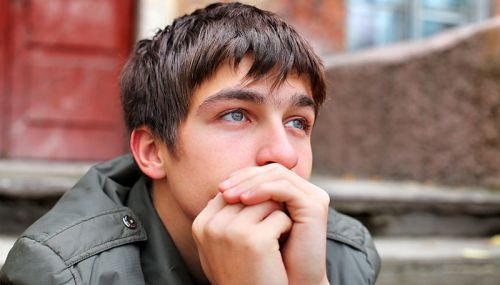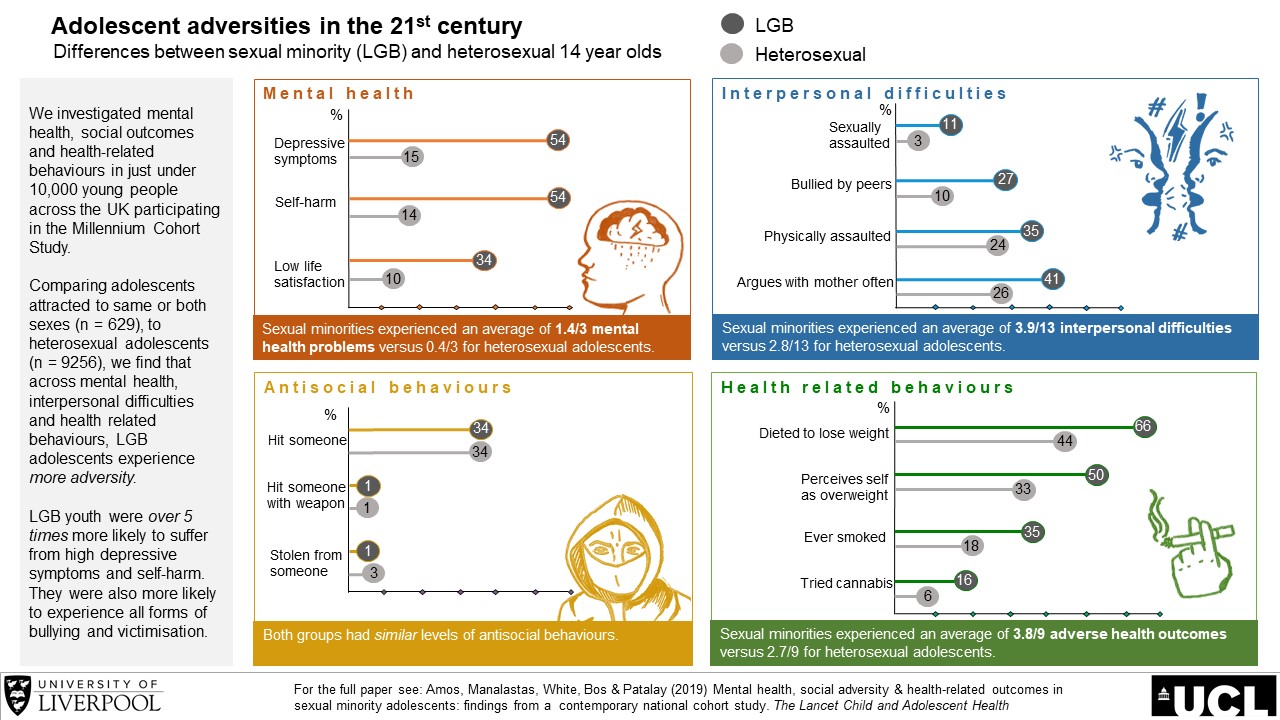- Our studies
- Our research
- Publications and resources
- Data access and training
- About
- News
- Events
- Get in touch
- Join our mailing list

Lesbian, gay and bisexual (LGB) adolescents are five times more likely to be depressed, and almost six times more likely to have self-harmed in the past year, compared to their heterosexual peers.
In addition, they are more likely to experience multiple risks together, including mental health problems, unhealthy habits, risky behaviours, bullying and relationship difficulties.
Researchers from the University of Liverpool and UCL Centre for Longitudinal Studies analysed data on more than 9,800 young people born in the UK at the turn of the century, who are being followed by the Millennium Cohort Study. At age 14, study members were asked if they were attracted to members of their own sex, both sexes, or the opposite sex.
The study examined whether LGB teens were more likely to experience poor mental health, including symptoms of depression and self-harming behaviour; unhealthy habits, such as lack of exercise and dieting; risky behaviours, including sexual activity and drug taking; bullying, by peers and online; and trouble getting on with family and friends. The researchers took into account other factors that could contribute to these risks, including their family background and composition, ethnicity, and gender.
As well as being at greater risk of depression and self-harming behaviour, LGB adolescents were three times more likely to be unsatisfied with life, and tended to have lower self-esteem.
Compared to their heterosexual counterparts, LGB teens were more likely to have drank alcohol, smoked and used cannabis in the past, but were no more likely to use these substances regularly. They had greater odds of being overweight and obese, tended to exercise less, and were more likely to diet. However, LGB adolescents were no more likely to have had sex or engaged in risky sexual behaviour than their heterosexual peers.
LGB teens were more likely to have been bullied by siblings, peers and online, and also had increased odds of experiencing verbal, physical and sexual assault. Although they tended to be less close to their mothers and fathers, and argued more with both parents, they were just as likely to have close friendships as their heterosexual peers.
LGB teens were also more likely than heterosexual adolescents to experience various risks at once. After looking at 28 different risk factors, the researchers found that LGB young people experienced an average of nine of these difficulties at one time, while heterosexual teens faced six, on average.

Differences in risk factors experienced by LGB and heterosexual adolescents. Click on the image to open at higher resolution.
Out of 9,885 study members who provided information about their sexual attraction at age 14, 629 reported being attracted to members of the same sex or both sexes –481 girls and 148 boys. The remaining 9,256 reported being attracted to the opposite sex or not attracted to the same sex.
Rebekah Amos, the study’s lead author, said: “Despite high profile policies such as the legalisation of same sex marriage in 2013 in England, Wales and Scotland and the introduction of sexual orientation as a protected characteristic during these adolescents’ lifetime, the evidence presented here indicates that large inequalities in social and health outcomes still exist for sexual minority adolescents growing up in the 21st Century.”
Dr Praveetha Patalay, co-author, said: “The study exposes the vast disparities in a range of outcomes between sexual minority and heterosexual young people, highlighting the need for further prevention efforts and intervention at the school, community and policy level to ensure sexual minority adolescents do not face lifelong adverse social, economic, and health outcomes.”
‘Mental health, social adversity & health-related outcomes in sexual minority adolescents: a contemporary national cohort study’, by Rebekah Amos, Eric Julian Manalastas, Ross White, Henny Bos and Praveetha Patalay was published in The Lancet Child and Adolescent Health in November 2019.
Ryan Bradshaw
Senior Communications Officer
Phone: 020 7612 6516
Email: r.bradshaw@ucl.ac.uk